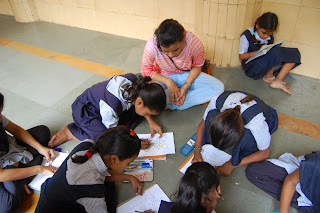We have read countless time that the basic
problems facing public/municipality school is lack of empathy/support from
Government and teaching staff. Government is always facing shortage of resources -Teachers, school buildings, study aids, etc
The obvious solution found a few years
back was using video tutorial. The advantage of it was you do not require a teacher
or internet facility on your computer. It was an answer awaited by all children
whose parents’ were not in position to sent them for private education. The technique was low-cost and effective.
 |
| CACR volunteers use Video Tutorials to teach English |
The basic problem this idea faces:
- No room for computer lab in schools. Certain classes in government schools are being closed down due to insufficient number of students, there is still no provision for a computer lab in many public schools of India
- A mandatory law that every school should have a computer lab with fully functioning computers and a computer teacher assigned is a must. A large population of educated Indians is unemployed and it’s time to accommodate them into public schools thus providing them an employment opportunity and resolving the teaching staff situation. Even retired or handicapped people should be given an opportunity for teaching positions.
- Maintenance of computers is another issue. In those schools where a lab is provided with the necessary software and a maintenance contract, still many of the computers are inoperable. No maintenance is done and no sign of future actions to get it done are in the to-do list. Neither the government nor the required school personnel are accountable for it.
- How to operate video tutorials? Students are definitely not born with an internal manual on how to operate computers or video tutorials. The only advantage the current and future generations have is their ability to grasp computers and other electronic gadgets like smartphone/tablet at faster rate than their parents.
 |
| E-Learning via Video Tutorials |
 |
| Students learn basic IT skills via Video Tutorials |
Once these bottlenecks are removed, we will have
a bright future for the BMC (inner city) schools and its students. All we need is
participation from all the stakeholders – parents, Government, teachers,
volunteers and public to give their time and effort to this endeavor.
-JZ is a engineer and a volunteer with +Citizens Association For Child Rights a non profit working in public schools on India to improve the standard of education and well being



